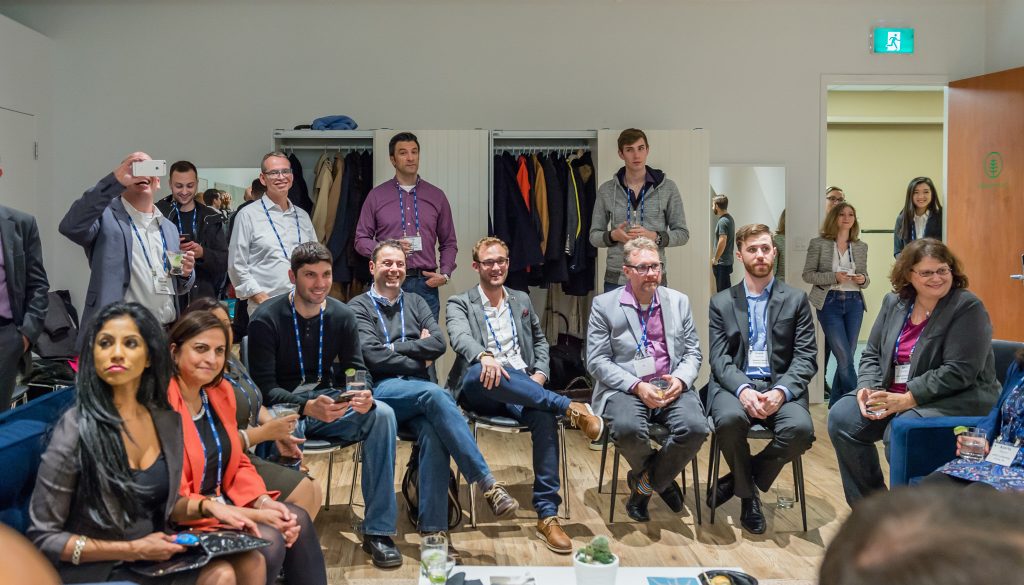As BetaKit’s Ask an Investor series often shows, there are common questions many entrepreneurs have when they’re thinking of raising funding. How do you determine valuation? Is a funding round something to be celebrated, or should you keep it to yourself? When is the right time to fundraise?
The Entrepreneurship Society tackled these questions for Toronto-based entrepreneurs at its Raising Capital event, hosted in partnership with the Canadian Venture Capital Association (CVCA). The night allowed entrepreneurs to get insider tips on fundraising rounds.
While funding stories get a lot of hype, investors and founders stressed that you should approach the decision to raise VC money with caution.
“If you don’t need to raise external capital, don’t. There’s no reason to give away part of your company if you don’t need the money,” said Jeremy Gilman, principal at McRock Capital. “Taking on debt has benefits relative to taking equity, such as not giving away ownership of your company, but taking on too much debt will make it very difficult to raise equity capital down the road if it hasn’t been paid off by then.”
Michael Silagadze, founder and CEO at Top Hat, echoed the sentiment that raising funding is not always the best measure of success for companies. “Raising capital is like taking out a high-interest loan which you’ll have to pay back in five to seven years by selling the business,” said Silagadze. “It’s generally not something to celebrate — companies should be celebrating real revenues and solving problems for their customers.”

Should a startup consider the fundraising route, Silagadze said the best way to set up a meeting with an investor is through an introduction by a founder that has raised money. “Don’t spend too much time at networking events and never ever send cold emails. Talk to founders and convince them that you’re working on something interesting and they’ll make warm introductions for you.”
When pitching, startups should be able to express the tangible ways their business fits into their market. If a VC can’t see your startup growing in the long term, they won’t think you’re ready for funding.
“Not every business is VC back-able because of factors such as addressable market being too small or the business model can’t scale fast enough,” said Christophe Bourque, VP of Tandem Expansion Fund. “Entrepreneurs should be certain that they are comfortable with the growth expectations that come with venture capital.”
“Focus on the real foundations of the business rather than hype. First, you need to prove to yourself that you’re building something that has the potential to scale before you go out and try to convince others,” Silagadze adds.
Startups should also take great care when discussing valuations with an investor. “Entrepreneurs need to consider the long-term effects of raising capital at high valuations or complex capital structures,” said Bourque.
While Gilman said founders should take a higher valuation from an investor even if they think their company isn’t worth that much, founders should ensure that number isn’t totally unachievable. “If you think the valuation is way too high and it will be difficult to justify over the next few years, or by the next time you need to raise capital, it may be worthwhile to discuss a lower valuation or taking less money now,” said Gilman.

Gilman also asked entrepreneurs not to take seriously the perception that VCs don’t care about their portfolio companies, and will drop their support as soon as companies experience roadblocks.
“Most VCs will spend a ton of time working with their portfolio companies to fix problems, replace dysfunctional management, provide additional capital to get them through a tough spot, et cetera. There are certainly some VCs that care more than others, and that is why entrepreneurs should think very hard about who they want as an investor,” Gilman said. “There are often benefits from taking a smaller cheque from someone who wants to be a partner in your success relative to taking a larger cheque from someone who just wants to be a capital provider.”
The next Entrepreneurship Society event — which will highlight digital marketing best practices and managing cap tables — is on January 11. Use the code BETAKIT to get 20 percent off on tickets.
Photos credit Lu Chau


